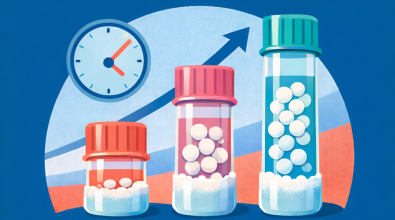
While there’s a long list of things that need to happen, at the right time, in the right place, in order for a woman to get pregnant, ovulation is definitely one of the most important pieces of the puzzle. Ovulation is the typically once-monthly process by which an egg, beginning in the follicle, matures and releases into the fallopian tubes, where it can be fertilized. Without ovulation, there’s no egg—and therefore no pregnancy.
Learn more about ovulation.
So what can affect ovulation, and therefore your chance of getting pregnant—or not getting pregnant, if that’s where you’re at?
Age.
If we’ve said it once, we’ve said it a thousand times: age is the primary factor affecting fertility, and can affect both ovulation and the viability of a woman’s eggs. A woman is born with all the eggs she’ll ever have—at birth, that’s about a million. As she gets older, she has fewer eggs in her ovarian reserve (egg count); plus, a higher percentage of those eggs become genetically abnormal due to natural aging (egg quality).
Contact Us to Chat with a Fertility Advisor
Learn more about the top 6 factors affecting female fertility.
Age can affect ovulation as a woman’s egg count gets particularly low, in the period known as “perimenopause.” During that time, which typically predates the “actual” menopause by several years,she may experience irregular ovulation, the telltale signs of which are irregular menstrual periods or wonky results when using ovulation predictor kits. Around age 51, on average, women enter menopause, considered the official end of ovulation.
However, it’s important to remember that egg count is only one factor in fertility; egg quality, which declines gradually as a woman ages, is much more important, and can impact a woman’s ability to get pregnant long before age can affect ovulation.
A proactive fertility assessment and ovarian reserve testing, like we offer here at Extend Fertility, can help women understand if they’re at risk for premature diminished ovarian reserve (DOR), premature menopause, or other conditions that can affect ovulation.
Learn more about what ovarian reserve testing can tell us.
Hormonal birth control.
Hormonal birth control, such as pills, patches, rings, and injections, are formulated so that they can affect ovulation in a way that prevents the user from getting pregnant. Ovulation begins in the hypothalamus, a region of the brain that releases a hormone—gonadotropin-releasing hormone—that kicks off the ovulatory cycle. That hormone then triggers the pituitary gland, also in the brain, to produce other hormones (luteinizing hormone and follicle-stimulating hormone), which stimulate your ovaries to produce still other hormones (estrogen and progesterone) that prompt ovulation.
Learn more about birth control and fertility.
Hormonal birth control uses synthetic versions of progesterone and/or estrogen to interrupt this process and prevent ovulation. For women who decide they’re ready to get pregnant, the good news is that hormonal birth control can affect ovulation for only as long as it’s in your bloodstream; for most types of birth control, that’s only about two to three months, maximum, after you stop taking it. (The exception to this is the birth control “Depo” shot, which is intended to be a longer-acting form of birth control and can affect ovulation for a longer period.) Hormonal birth control doesn’t have a long-term effect on fertility.
Polycystic ovary syndrome.
While the cause of polycystic ovary syndrome (PCOS) is unknown, it’s characterized by the presence of two or three clinical signs: infrequent, irregular, or prolonged menstrual cycles; elevated levels of male hormones (androgens), that sometimes cause excess facial and body hair or acne; and polycystic ovaries, meaning the ovaries have an overabundance of immature egg follicles (cysts) but fail to regularly release eggs (ovulate). These cysts often appear arranged around the periphery of the ovary, in what’s known as a “pearl necklace” formation.
We also know that carbohydrate metabolism, or the body’s ability to break down and process the carbohydrates you eat, play a role in PCOS. Insulin, a hormone produced in the pancreas, allows cells to use sugar, the body’s primary energy supply. If cells become resistant to the action of insulin, blood sugar levels can rise, and the body might produce more insulin to compensate. Studies suggest that excess insulin increases androgen production, which can affect ovulation and cause the symptoms of PCOS.
The good news is that, because PCOS is connected to insulin levels, it can respond to simple, non-medical interventions, such as improved diet, exercise, and weight loss. Hormonal birth control can also help manage the symptoms of PCOS for women who aren’t looking to get pregnant. Because PCOS can affect ovulation, it’s a common cause of female infertility; in addition to lifestyle changes, there are several medication options that can help women with PCOS get pregnant by medically inducing ovulation.
Endometriosis.
Endometriosis is a condition in which the tissue that lines the uterus, known as the “endometrium,” begins to grow on other organs inside a woman’s body, like the ovaries, the outside of the uterus, or Fallopian tubes. These tissues grow, thicken, breakdown, and bleed just like the endometrium inside the uterus, except because they’re outside, this cycle can cause irritation or inflammation in surrounding organs or even produce scar tissue, known as “adhesions,” that can cause organs to attach to each other. Endometriosis is a common cause of fertility issues, and can be painful or even debilitating.
Endometriosis can cause fertility issues by producing a physical blockage to the reproductive system. The disease can also damage the egg supply in the ovaries, and the resulting inflammation—as well as diminished ovarian reserve—can affect ovulation, as well. As endometriosis expert Dr. Iris Orbuch explains, the condition both “decreases a woman’s ovarian reserve [and] decreases fertility by either an anatomical distortion or via inflammation.”
Additionally, while surgical treatment of endometriosis, known as laparoscopy, offers long-term pain relief, studies show that it can reduce ovarian reserve (and therefore can affect ovulation) by inadvertently removing healthy ovarian tissue or cutting off blood supply to the ovary. It’s also possible that endometriosis may reduce egg quality, possibly by creating an inflammatory environment in the reproductive system; this is a matter of debate in the scientific literature. Concerns regarding the effect of endometriosis on egg quality and quantity have prompted many experts to recommend that women with endometriosis freeze their eggs.
Learn more about endometriosis, fertility, and egg freezing.
Body weight.
Being too overweight or too underweight can affect ovulation.
According to an article in the journal Reproduction exploring the well-supported relationship between obesity and infertility, excess body weight can affect ovulation by throwing off the delicate balance of hormones required for a healthy menstrual cycle. How? One theory is that an excess of adipose (fat) tissue, an important site of steroid production, has been shown to increase the levels of certain steroids in overweight women. This steroid increase can reduce the ability of important reproductive hormones, such as estrogen, to get where they need to go, which can affect ovulation. Obesity may also be related to insulin resistance, which, as in PCOS, can affect reproductive hormone levels.
On the other hand, though, being significantly underweight, having a very low body fat percentage, or vigorously exercising over 60 minutes per day can also affect ovulation. Ovulation and menstruation require a lot of energy from a woman’s body. When someone is very underweight, their body attempts to conserve energy by putting a pause on certain functions, like ovulation. (This is why women with eating disorders like anorexia nervosa typically lose their menstrual periods.) It’s also believed that—again, because body fat affects steroid levels, and steroid levels affect the flow of reproductive hormones like estrogen—too little adipose tissue, just like too much, can affect ovulation by preventing hormones from getting from the brain to the ovaries.
Endocrine disorders.
If we’ve learned anything by now in this post, it’s this: the human body is a complex, interconnected network that requires a pretty specific balance in order to function properly. That’s exemplified perfectly by the fact that disorders of far-flung parts of endocrine system (like the hypothalamus, thyroid, or pituitary gland) can affect ovulation, which happens in the ovaries.
The fact is, as organs which produce hormones, the ovaries are part of the endocrine system, and are in constant communication with its other parts. So if another organ in the system is working too hard—or not hard enough—it can affect ovulation and other functions of the ovaries.
One example is the thyroid, which produces thyroid hormones that control the metabolism of every cell in our bodies. Both an overactive (hyper) or underactive (hypo) thyroid can affect ovulation and are associated with reduced fertility and irregular menstruation. And, in some cases, thyroid disorder and ovulatory disorder may both be related to a problem in the hypothalamus or pituitary glands, which control them both!
Sleep disruption.
While research into the connection between sleep and fertility is still a work in progress, disrupted sleep cycles has been correlated with menstrual irregularities, increased instances of PCOS, dysmenorrhea, and increased time to, and reduced rates for, conception—among other negative reproductive health outcomes—in several studies. Primarily a concern for people who work late nights or irregular shifts (or who experience sleep disorders like insomnia), it’s thought that sleep disruption can affect ovulation because sleep may be a factor in the body’s regulation of:
- TSH, explained above
- Luteinizing hormone (LH), which triggers ovulation
- Follicle-stimulating hormone (FSH), which helps ovarian follicles mature
- Progesterone
- Or other important hormones that can affect ovulation.
Since research is still limited, it may not be that sleep disruption can affect ovulation—it may be that both sleep and ovulation are being affected by some other imbalance. What is clear is that healthy sleep is pretty crucial for health, in general—so making regular shut-eye a priority definitely can’t hurt.
Have more questions about what can affect ovulation, fertility, or egg freezing success?




